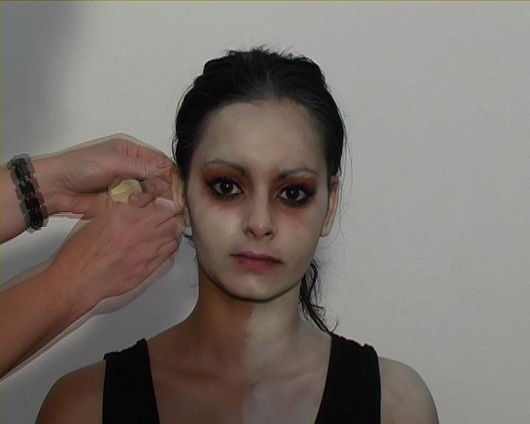Research Exhibition SWITZERLAND IS NOT AN ISLAND #1 - Undesirable society, inconvenient company
Shedhalle / Exhibitions / SWITZERLAND IS NOT AN ISLAND

"Miss Roma", video still, Tamara Moyzes
The current program of exhibitions, films and event „SWITZERLAND IS NOT AN ISLAND“ adresses the social exclusion and persecution as well as the cultural and political selforganisation of Roma, Sinti and Yeniche people in Switzerland and Europe.
The regulation of public space through a ban of begging or other policies of spatial exclusion will be linked with the question of distribution of wealth and the „making-invisible“ of poverty. But also, counter-strategies will be formulated. Furthermore, the program will discuss questions of political exile, border and migration policies.
The issue of political exile will be revisited in the second core theme of the program. In relation to the „Richard Wagner Year“ 2013 the program will critically discuss the production of the artistic genius as a strategy of commodification and politics of location. Different projects will query the transformation of an anti-Semitic political activist and (cultural-)political key figure for the nazis into a dazzling role model for Switzerland as „country of exile“ - while others, who are seeking shelter, a better life or simply their livelihood in Switzerland are being marginalized, criminalized and pushed out of public life and space.
************************************
In societies that are marked by racism, there is a rule of conflict between those who „belong“ and those who do not „belong“ – and therefore must be included, controlled or „integrated“. The conflict in question is about the definition of social normality: Who can or may take part in decision making processes and to which extent? How must the individual behave, speak and look like? How and by whom this normality is being fabricated and how and by whom is it supervised, controlled and „executed“?
This order of normality not only defines the access to ressources - which are created by all, also by the marginalized - and which should be therefore accessible by all, with equal rights. At the same time, what is at stake is the right to speak for oneself, being visible and equally take part in the organization of common life. The mentioned conflict is therefore one about equal policital, social, economical and cultural rights and about the conditions for speaking, acting and existing.
For the marginalized, be they minorities, migrants, sexually deviant, socially deprived or unemployed, the desire for taking part in the social order means having to hustle between one´s own endeavour to have a selfdetermined and „good“ life, constantly having having your own life examined and constrained as well as being discriminated against and being excluded through racist and antisemitic, through sexist or classist structures and daily hostilities.
For Yeniche, Roma or Sinti, this situation is and – since centuries was – a part of their daily life. It made it necessary to work for the abolition of social inequality and against discrimination, applying different strategies at the same time: be it the discovery, creation and occupation of different niches which insure subsistence, the transfer of knowledge beyond institutions that are controllable by state and majority society. Knowledge against policies of assimilation or integration or policies which seize language, lifestyle decisions or social structures and knowledge that makes it possible to deal with identities that are socially imposed and with the discrimination that goes along with them.
************************************
The art works, publications and research materials shown address the strategies of Yeniche, Roma and Sinti people in dealing with ascriptions as well as experiences with racism, how they define themselves, how they locate themselves in society and how they resist the „racist knowledge“ of the majority society and their own marginalization.
Mo Diener researches about different aspects of the life of Yeniche people in Switzerland and shows conversations with swiss Yeniche who talk about their way of life, their jobs, their selfdefinitions and –organisations.In her work „Die Beichte“ („The confession“), Eva Merckling -Mihok departs from her own autobiography beeing the daughter of a Czech Rom father and a Swiss mother and shows how she redefines the situation in a selfdetermined way. Tamara Moyzes ironizes the forced adaptation to legitimate „looks“ - in her video „Miss Roma“ she shows the transformation of a Romni into a blonde „beauty“.Marika Schmiedt deals with continuities of exclusion, persecution and silencing in her films „An undesirable society“, „Roma Memento. Uncertain future?“, „LEGACY“ and „Memory“. Romnija of different generations outline their life stories, discuss strategies of „survival“, inscribe themselves into history and confront the majority society.
************************************
The research exhibition SWITZERLAND IS NOT AN ISLAND assembles art works dealing with focus topics as well as publications and research materials in form of a research library. In the course of 2013, the exhibition is being extended with further thematic focuses. The research library is continuously being supplemented. It is the basis for workshops, discussions, poster campaigns or actions and other interventions. It is available for visitors for reading and as research material.
